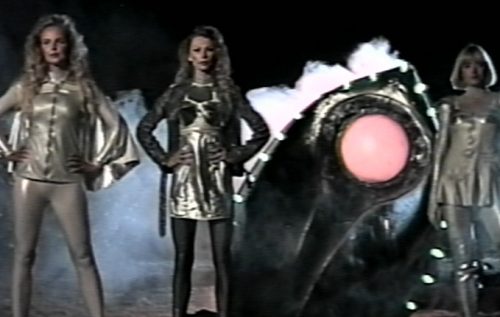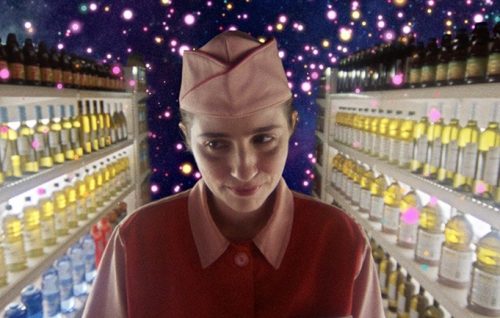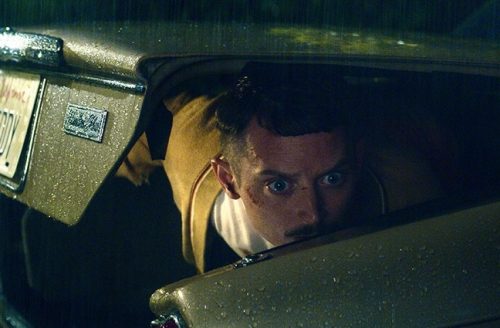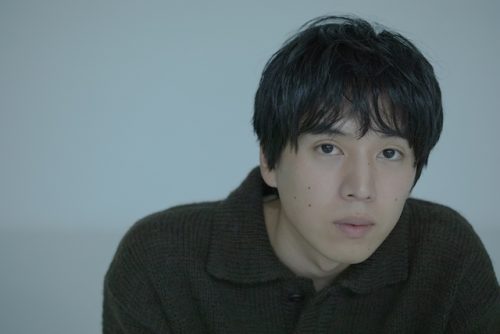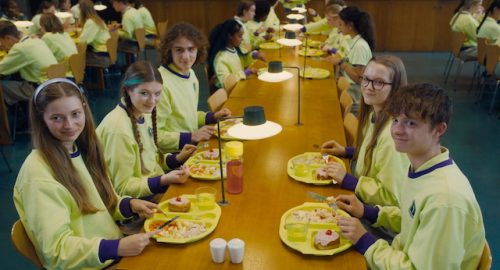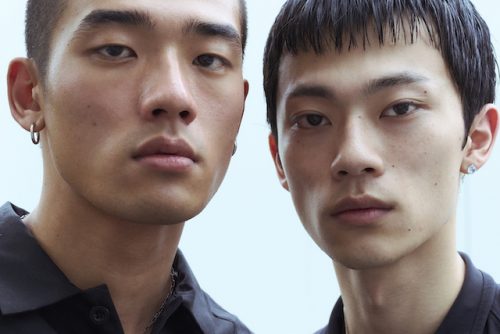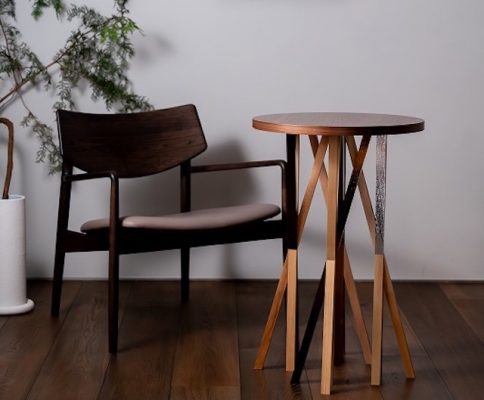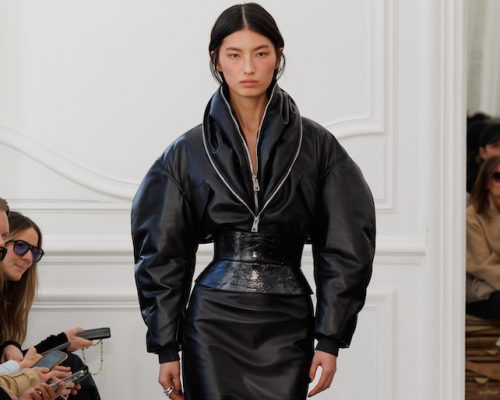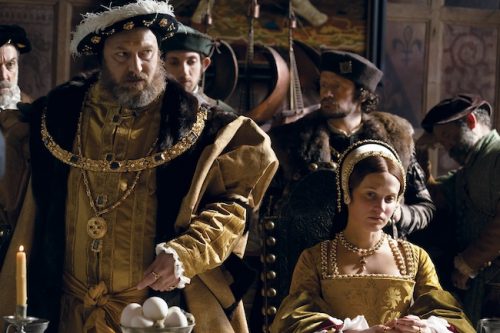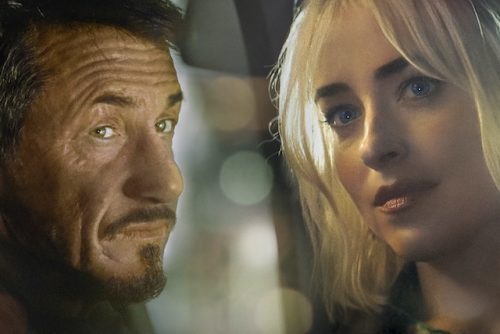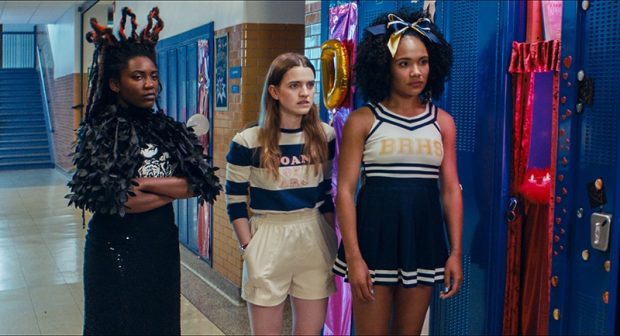
KNIVES AND SKIN takes place in a tiny rural midwest town like many a high school film before it, but the happenings in this particular locale are far from conventional. The film follows a group of teenage girls grappling with the disappearance of one of their own: pretty blonde marching band captain Carolyn Harper. The girls feel lost, maybe afraid that if someone hurt Carolyn, they could be next. Or maybe they’re just lost because they’re teenage girls, a challenge even without the added mystery.
Like many high school movies, there are different cliques represented: fashionable rebels, sexually confused cheerleaders, horny jocks, wholesome brainiacs, and all the rest. Yet Jennifer Reeder’s film transcends the cliché divides of high school life. The feelings she explores are deeply human and are often made clearest in song form. At key moments in the film, the characters break out into melancholic interpretations of ‘80s New Wave hits — sometimes in realistic situations like a choir class, and sometimes in fourth-wall-breaking musical moments. In every case, it’s a moving and original technique that gets to the heart of these characters.
ーーThanks for making such a great film.
Jennifer : Filmmakers have a life because of film festivals like this one. Two years ago in 2017, I was in this exact venue to screen another feature film I did called “signature move” which is on amazon. It’s very different from “knives and skin” but it feels pretty significant to have made two feature films in two years. Maybe that is a testament to what women are doing or have done these days. I won’t belabor this. But this is a film that I made, totally from my heart. “Knives and skin” is exactly the film that I set out to make which is not always the case. When you’re dealing with lots of people and lots of money then creativity is sometimes altered and I was very lucky to have worked with the production team in Chicago and cast this team entirely out of Chicago. I think any of you, who are based here in Austin know that there are lots of amazing things that happen between the coasts and it’s kind of the best kept secrets you know. So you can just really hunker down and get the work done and really align yourself with the people who really champion your creative vision. So this film was created entirely from my heart and it really is a love letter to girlhood.
ーーI know you get this all of the time in some form about your inspirations but I’m really curious as to hear about the moments in your life that you are comfortable sharing with us that inspired the friendships, the relationships that we see in this film.
Jennifer : I definitely want to promote this film as a feminist film about the idea that female friendship is a survival strategy. The storyline of the film for the high school girls being courted by the teachers had actually happened to me while I was in high school. So at some point when I was an adult, I realized that I wanted to put that into a film to think about what it meant as an adult woman. Think back at the teenager me to try and understand what that motivation was for that guy and that actually happened to me a lot and a lot of my friends. But I wanted to make a film that reflected my life. I grew up in the middle of Ohio, relatively rural. I was this gothy, punky girl in high school who was a contrast to the environment. So I just wanted to talk about the misfit girls in non urban environments who are simply trying to live their life when the adults around them are doing everything they can to try and disrupt the evolution of their process.
ーーYou mentioned a little bit in your intro about the casting process but tell us a little bit about using Chicago specifically.
Jennifer : Actually when this project was in development we thought about shooting it in Kentucky and in Ohio. Producers kind of came on and came off and then the Chicago based producers who had also produced signature move said ‘well, if you want to shoot it in Chicago then we would happily help you do that’ but I thought ‘no because it’s not an urban film’ you know? But for all of the Cory stuff and the external scenes that are clearly not in the city, we went to Lamont which is 30 miles south of the city. I mean Chicago is a place where you don’t have to go very far to feel like you’re outside which is kind of like honestly everywhere in the United States. But this film is a testament to the places that are not like New York because like I said in the intro we cast this entire thing in Chicago. The entire cast and crew are from Chicago and the locations were all in Chicago or around Chicago so I think that it’s just important to continue to make and champion the films that are between the coasts. But don’t tell anyone on the coast. It’s like fight club. Whatever we say in this room, stays in this room.
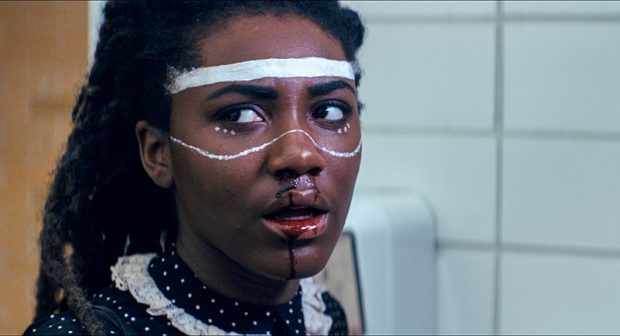
ーーCan you talk about Nick Zinner and how he was involved in the process?
Jennifer : Nick Zinner who is the lead guitarist for the Yeah Yeah Yeahs did the score for the film. I met him through a mutual friend of ours who is now a DP in LA but was a band guy in New York. And Nick did the score for a short film I had done maybe two years ago so when I had the green light for Knives and Skin, honestly before I had a DP attached, anyone besides myself attached, I sent the script to Nick and was just like ‘Hey man, would you want to score this film?’ and I didn’t hear back from him for two weeks and I thought I had completely insulted him. Then two weeks later he texted me and he responded saying ‘Oh god, I thought I had already responded. Yes, I would absolutely love to score for this film’ We were in production right before the Yeah Yeah Yeahs were going on tour so based on the script and just based on the conversations on how I thought the music should sound, he dropped about twenty two tracks of music just really based on ‘here are some ideas’ which is amazing you know. The film is packed with music. Any of you who have seen any of my films will know that I pack my films with music. I cannot sing one note but I deeply respect musicians because music is just really my religion. Then we worked back and forth and dropped the tracks in and said ‘that will be Caroline’s theme’ and so he didn’t have to rewrite a ton of stuff but maybe variations on her theme so that every time we see her or whatever. I’m in development with a new script and I asked him the other day and was like ‘Hey little vampire, can I send you this treatment, maybe think about scoring the next one?’ and he was like ‘Yeah, sure. Send it.’ So I don’t know, all of those weird goth kids are super approachable and making it happen.
ーーThe music and the colors. Do they go together in terms of empathy in the film?
Jennifer : For sure. Before I was a filmmaker, I was a ballet dancer. From a very young age I understood how music can tell a story and ballet -The Nutcracker, Giselle or Swan lake- and all of those stories are deeply filled with drama and pathos. So that gets entirely injected into my films and then the color. I had many conversations prior to production with my DP and the gaffer and said ‘I want this to be drenched in femme colors.’ You know like pink and purple and make this film feel really femmy. And they were just like ‘Oh my god, great’. The first day of production, my gaffer put this beautiful light kind of falling across the floor way in the back of the scene and he said, ‘Is that too weird?’ and I said, ‘From this moment on never ask if that’s too weird. Just lean into weird.’ There will be people walking out saying they don’t get it but the people who get it, the music sinks in and the colors sink in and cinema is art right?
ーーCan you tell us about the glowing blood part?
Jennifer : I wanted to make a feminist film where a dead girl was a huge part of the plot point. We are all here at fantastic fest and we all love genre films but dead girls are a problematic trope in so many of these films right? So I wanted to make a film where my dead girl had will and agency and aura. So when she carves that c into his head for her initial, not only does that C glow saying like ‘I exist’ but after we know that she’s dead, his wound won’t heal. He’s not responsible for her death but I just wanted Caroline Harper to have will and agency throughout the film. So even when her blood glows and her eyeglasses glow. The eyeglasses glowing kind of relates to the talking tiger shirt. I’m not a religious person but I do believe in metaphysics. We all have a favorite shirt or pair of shoes and I guarantee you those items while your sleeping give you advice. You wake up and say ‘I feel much better now and I wonder why’ and it’s because the things around us have been injected with our spirits and vice versa or at the very least, we keep things that have belonged to people who have passed away. They smell and it’s just a part of that person. So the glowing things in particular are saying that, everything around has energy that we can take and honor.
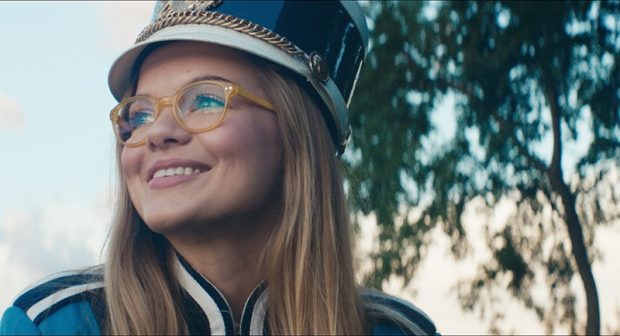
ーーCan you talk about the young teenage women in the film and the process of working with them?
Jennifer : So if any of you are curious as to what I have done prior to this, I have a ton of short films that are all about experiences on young women on Vimeo. You can see I have done a lot of short films that have led up to this film. I get asked this question all of the time. I did a short film in 2014 called Million Miles Away that has 23 actual teenagers. The women in this film were 18 to 24 so they weren’t actual teenagers at all. But previous to this, I loved casting a 14 year old to play a 14 year old. The hard part about doing a feature length film is that 14 year olds can only work for 8 hours and sometimes their parents are lurking or whatever. But these questions about ‘How was it working with all of these girls?’ it’s like saying, ‘You just made a fucking film with like 40 wolverines (laughs)! How was that?’ And I am like ’Yeah it was pretty cool’. It was loud in between takes because they would be chill during takes but then in between takes they would (makes loud chatter sounds). But with this one, it was insanely sweet. So the very last scene of the film was at a football game and we shot the football game in two parts. So we shot all of our stuff at the football stadium. Totally empty football stadium that had all of our actors and we could control the sound and what not. But then we went back later and shot an actual football game. But on the day we were shooting the football game, all of the teenagers were there but they were getting released at different times. So we shot with Jaylin who is the Jockey, the African American football player and he was released but none of them would leave. I would turn around and say ‘You guys are wrapped. You guys aren’t getting paid anymore.’ But they all waited for each other. They would say ‘But no Emma’s not wrapped or Kayla’s not wrapped…’ so all of them literally waited until midnight so they were all wrapped together. I feel like filmmaking is, like you write these stories about people who you want to represent authentically. And you cast these actors that just take on a role that has nothing to do with them in real life. Then you shoot it but then the actors and the whole crew are a part of this intensely emotional journey and it’s totally unreal. It’s unreal but it’s completely real. So all of the young people in the film, over the course of making the film became really close together to the point where they have invented a hashtag that they all send to each other. And I was like what does that mean? Anyway the young people were incredible and they are wickedly talented people in Chicago that if you want to hire them you should or hire actors in Austin. This was an emotional set. The night that we shot that scene where the mom breaks down after the melting cake and says ‘I’m useless’ and then the girls say ‘ No, you’re not. You taught us how to sing and they sing girls just wanna have fun.’ We probably shot that at one in the morning in a super tiny tiny house with no AC in July in Chicago which probably feels like every fucking day in Austin, Texas (laughter). I was trying to be focused. I was looking at my monitor and was like ‘Good, great.’ and I turn around and the entire grip and electric team which are these big people and I see them (makes crying noises). Like the emotionality and the pathos in the film kind of vibrated into every actual moment but like I said at the beginning, this film is a love letter to girl power and to girlhood but also just to youth. A love letter in a way to myself who I was when I was 14 and I think we as a culture need to listen to young people more and consider them and young people have agency and they are smart amazing people and they will inherit this world so we have to encourage them so this is a love letter to them. Until I am not obsessed with telling stories about young women, I will continue to make stories about young women featuring actual young women.
ーーThank you so much Jennifer.
text Ryoko Kuwahara





